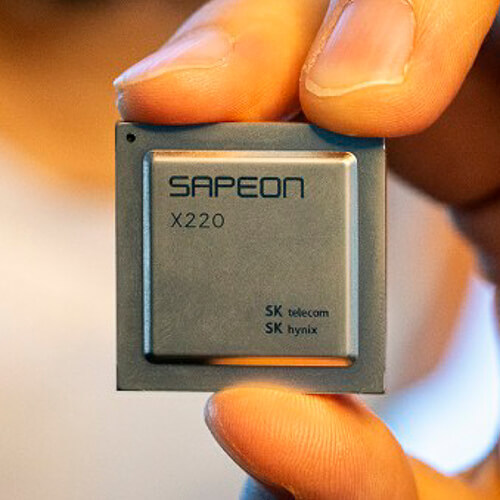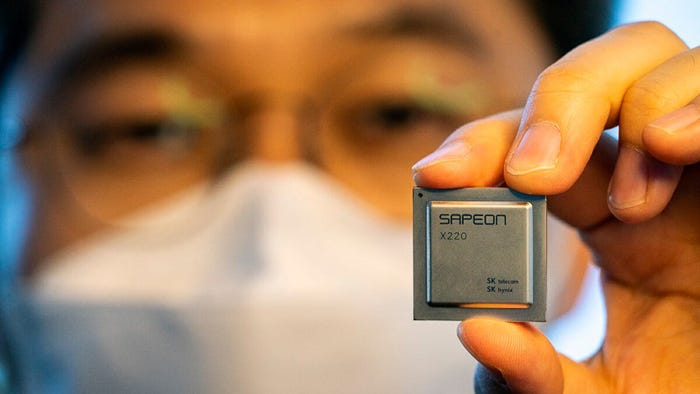South Korea's SK Telecom has data center and AI-as-a-service ambitions for its new AI chip, 1.5 times faster than a GPU but half the price.

South Korea has made a bid for the AI top table, with its national carrier unveiling a powerful artificial intelligence (AI) chip.
SK Telecom unveiled the chip, the Sapeon X220, on Wednesday, accompanying a new strategy of building on the semiconductor to provide AI data centers and AI-as-a-service business.
The chip, one of a growing breed of application-specific integrated circuits, is 1.5 times faster at deep learning tasks than a Graphics Processing Unit (GPU), while using 20% less power and half the price, says the operator.
Figure 1:  Chips are down: The Sapeon X220 AI chip is 1.5 times faster than a GPU while using 20% less power.
Chips are down: The Sapeon X220 AI chip is 1.5 times faster than a GPU while using 20% less power.
(Source: SK Telecom)
It uses parallel processing to speed up deep learning computation tasks to 6.7 kiloframes per second, while using only 60 watts of energy. Data centers set up for devices like driverless cars and drones. The nation of 52 million was first in the world to roll out commercial 5G in April 2019.
Beating US and China was a quiver in the bow of the country's telecoms industry, and buoyed hopes by Samsung in taking on Apple as a top-tier smartphone maker and Huawei as a provider of 5G infrastructure.
AI Gangnam Style
Chips currently make up a fifth of South Korea's exports.
SK Telecom is the East Asian country's largest carrier, with over 30 million subscribers and nearly 50% market share, and is part of SK Group, the third-largest conglomerate, or chaebol.
The chaebol has 95 member companies and expanded into the semiconductor business in 2010, when it acquired a majority share in the former Hyundai Electronics, which then joined the group as SK Hynix.
SK Hynix is now the second-largest memory chipmaker. Samsung overtook Intel as the world's largest in 2018. Together, SK Hynix and Samsung control roughly two thirds of the world memory chip market.
SK텔레콤이 일산 킨텍스에서 열린 ‘한국판 뉴딜, 대한민국 인공지능을 만나다’에서 자체 개발한 세계 최고 수준의 데이터센터용 AI 반도체를 선보이고 향후 AI 반도체 사업 비전을 밝혔습니다.
— SK telecom (@SKtelecom) November 25, 2020
▶ https://t.co/9oaYoH0zX2 pic.twitter.com/LBkC0wHd0P
It is a market that is likely only to grow more globally competitive.Amazon and Google are investing in their own semiconductor chips aiming at server applications.
South Korea's government has sunk $542 million into semiconductor development in recent years, with plans to invest $900 million more in the next decade. Meanwhile, the US Department of Energy announced $1 billion in funding for private-public AI partnership projects this summer.
No more Mr. Nice AI
Targeting applications that bring AI close to cloud end-users would play well off South Korea's strengths in chipmaking and 5G, goes SK Telecom's reasoning. Putting AI chips like the Sapeon X220 close to the edge would let devices benefit from quite good AI, with very low latency. Nice if you're running a car or drone with it.
Meanwhile, the telco thinks finding more AI applications in the data center world will help provide new ways to crunch users' data, with speedier algorithms for uses like video recognition, voice recognition, or content recommendation.
As next steps, security company ADT Caps (which SK Telecom bought from the Carlyle Group in 2018) is going to develop an AI-based video monitoring service, which it will call T View.
Want to know more about AI and automation? Check out our dedicated AI and automation channel here on
Light Reading.
The operator will try to use the new chip next year to improve the voice recognition capability of its AI assistant NUGU.
And the new AI will also go to work offering better content curation in SK Telecom's over-the-top broadcast joint venture with the US's Sinclair Broadcasting, called Cast.era. But this being 2020, it might be most interesting to see where SK Telecom's forays into AI telehealth go.
Last month, the operator started testing an AI which offers a voice analysis tool to diagnose dementia and other memory disorders in elderly people. It has worked on this with Aria Care Korea, which works with memory disorder sufferers and a social enterprise called Happy Connect.
Pretty fly for a new AI.
Related posts:
— Pádraig Belton, contributing editor special to, Light Reading
Read more about:
AsiaAbout the Author(s)
You May Also Like





.jpeg?width=300&auto=webp&quality=80&disable=upscale)





